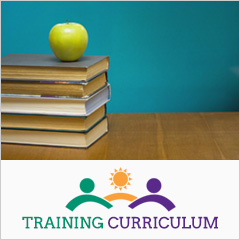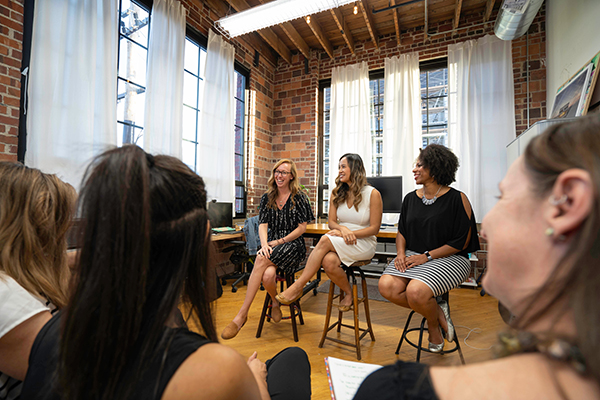

The Tool Box needs your help
to remain available.
Your contribution can help change lives.
Donate now.
 with an apple on top of them." width="" />
with an apple on top of them." width="" />
Sixteen training modules
for teaching core skills.
Learn more.
| Learn how to plan, prepare, conduct, and use focus group results to receive qualitative data for deeper understanding of community issues. |

A focus group is a small-group discussion guided by a trained leader. It is used to learn about opinions on a designated topic, and to guide future action.
A focus group is different in three basic ways:
Because focus groups are structured and directed, but also expressive, they can yield a lot of information in a relatively short time.
Focus groups help people learn more about group or community opinions and needs. In this respect, they are similar to needs assessment surveys.
But needs assessment surveys typically have written, closed-ended, relatively narrow questions which are quantitatively scored. The person being surveyed often responds with a numerical rating, rather than with a verbal statement. Such surveys can be very useful; but they usually can't capture all that a person is thinking or feeling.
Responses in a focus group, on the other hand, are typically spoken, open-ended, relatively broad, and qualitative. They have more depth, nuance, and variety. Nonverbal communications and group interactions can also be observed. Focus groups can therefore get closer to what people are really thinking and feeling, even though their responses may be harder -- or impossible -- to score on a scale.
Which is better? Both of these methods are useful. And both can be used together, to complement each other. Which should you use in a specific situation? That depends upon your own needs and purposes, and the resources available to you.
A focus group is not for every social situation. But it can be useful in many situations where action should be guided by public opinion.
Should you collect your opinions from groups, or from individuals? The focus groups are, of course, groups. Most surveys, though, cover one person at a time.
One advantage of focus groups is depth and complexity of response, as mentioned before. And group members can often stimulate new thoughts for each other, which might not have otherwise occurred.
But there are some downsides, too.
For example, focus groups usually take more time per respondent than individual surveys -- because the group has to be recruited, and because the group itself takes time. Some group members might feel hesitant about speaking openly. And the focus group leader may sometimes need to be paid.
Of course, it's also possible to combine the advantages of both methods, and interview one person at a time in depth. But this can be time-consuming, and take more resources than you have on hand.
Consider your own situation. How do these factors trade off? What is the best solution for you?
A focus group is a small-group discussion guided by a trained leader. It is used to learn more about opinions on a designated topic, and then to guide future action. The group's composition and the group discussion should be carefully planned to create a nonthreatening environment, so that participants feel free to talk openly and give honest opinions. Since participants are actively encouraged to not only express their own opinions, but also respond to other members and questions posed by the leader, focus groups offer a depth, nuance, and variety to the discussion that would not be available through surveys. Additionally, because focus groups are structured and directed, but also expressive, they can yield a lot of information in a relatively short time. In short, focus groups are a good way to gather in-depth information about a community’s thoughts and opinions on a topic.
Recheck your goals. Ask:
Consider other methods.
Are you planning to use other methods for learning about opinions as well?
In other words, so far: Think before you start, look before you leap.
Find a good leader.
This is not a casual matter: Your leader will determine the success of your group. What kind of leader do you want? Probably someone who:
Take a careful look around. Perhaps you can find the right leader within your own organization. It's possible you can do the job yourself (but don't overestimate [or underestimate] your own abilities.) Depending on the situation, you might consider looking for someone outside your organization, someone that specializes in facilitating these kinds of groups.
Find a recorder.
A small but important point, often neglected. You want to make sure people's ideas don't get lost. Someone should be writing down what is said, in the same way as taking minutes at a meeting. Arrange for this in advance. (Alternatively, you can audio-record, with the group's permission. This will take more time -- to transcribe the audio, and interpret the transcription-- but you will have a more complete, accurate, and permanent record.)
Decide who should be invited.
Ideally, those invited should be a representative sample of those whose opinions you are concerned about.
Suppose you're concerned about the opinions of public housing tenants. You would then want to spread your invitations across the different public housing facilities in your community -- not just the best, or the worst, or the most vocal.
Or suppose you are concerned about the opinions of Main Street shopkeepers. Get a complete list. Select a representative group, for example by size, type, or whether they have local or outside ownership. You probably want to hear from all kinds of businesses; so make sure you do.
You could even pull the names out of a hat. (This approaches a "random sample.") Or, better yet, if you had time, you could run several different groups, to include more people, and more different kinds of people.
Decide about incentives.
That is, should you offer an incentive for people to participate? Maybe not. In that case, why should people come? What's in it for them?
Possibly people will come just because they want to help. Or because they think they will meet other interesting people, or learn something, or just have fun. Maybe the novelty of the experience itself will be a motivator. And maybe all these reasons are true. (Or at least people believe them.)
But maybe those reasons aren't enough, and some other incentive is called for. Money is one; sometimes focus group members get paid, even a small amount. (Focus group leaders may get paid, too.) If you can afford this, consider it. If you can't, then think about other possible incentives: food and drink (more than chips and soda?); public recognition; something to take home; a later training opportunity. What will do the job?
Decide on the meeting particulars.
Pin these down before you start signing people up.
Prepare your questions.
Go in prepared. Write out in advance a list of topics and questions you want to ask. This will serve as your guide.
Below are some examples of general questions. These apply largely to groups discussing a current program or service, but they can be adjusted for planned programs, as well as for groups dealing with other concerns. The precise language and order of presentation will depend on your topic and group, but some of these questions may be adapted to your own needs.
Recruit your members.
Call them up. Email them. Or find them.
Double-check.
Review the arrangements. Is everything ready to go?
Conduct the group
A common sequence of events for many focus groups goes something like this: (The leader usually takes responsibility for carrying them out.)
Some common techniques
Reminder #1: Be sure to record. If the group is not being audio-recorded, someone should be writing the key points down.
Reminder #2: Of course, the leader's job is to elicit opinion, and not judge it. All opinions should be respected.
Look at the data
If you have audio-recorded, make a transcript. If not, make a written summary from the group notes. But in any case, look closely at the information you have collected.
In some cases, you can devise and use a coding system to "score" the data and count the number of times a particular theme is expressed. Experience helps here. But whether you do this or not, try to have more than one person review the results independently. (Because even the best of us have our biases.) Then come together to compare your interpretations and conclusions.
Share results with the group.
They gave you their time. The least you can do is to give them some feedback -- it's an obligation that you have. This can be done by mail, phone, or email if you'd like. Sometimes it's even possible to bring the group back for a second session, to review results, verify their accuracy, and/or explore other themes.
And note: Perhaps members have now become more interested in the issue, and would like to get more involved. Consider offering them an opportunity to do so. A focus group, indirectly, can be a recruiting tool.
Use the results.
Collecting useful information was the reason you wanted to do a focus group in the first place. Now you have the opportunity, and perhaps also the responsibility, to put it to use. You can improve the situation that originally motivated you, and made you think about a focus group at the very beginning.
A focus group is a small-group discussion guided by a trained leader. It is used to learn more about opinions on a designated topic, and then to guide future action. The group's composition and the group discussion should be carefully planned to create a nonthreatening environment, so that participants feel free to talk openly and give honest opinions. Since participants are actively encouraged to not only express their own opinions, but also respond to other members and questions posed by the leader, focus groups offer a depth, nuance, and variety to the discussion that would not be available through surveys. Additionally, because focus groups are structured and directed, but also expressive, they can yield a lot of information in a relatively short time. In short, focus groups are a good way to gather in-depth information about a community’s thoughts and opinions on a topic.
Contributor Bill BerkowitzOnline Resources
Designing and Conducting Focus Group Interviews, by Richard A. Krueger, is concise resource with specific steps and tips on conducting group interviews.
Guidelines for Conducting a Focus Group is provided by Eliot & Associates. In this guide you will find checklists and samples of items such as focus group questions, recruitment flyer, invitee tracking form, introductory remarks, sample consent form, data analysis format, and synthesized report format. This is another excellent and detailed example.
Introduction to Conducting Focus Groups, by NOAA Coastal Services Center, is a comprehensive introduction to key elements and practices that will increase the success of a focus group effort. Topics covered in this publication include focus group basics, preparing for the focus group, developing effective questions, planning the focus group session and analyzing the data.
Living Room Conversations works to heal society by connecting people across divides - politics, age, gender, race, nationality, and more – through guided conversations proven to build understanding and transform communities.
Toolkit for Conducting Focus Groups, provided by Omni, is a great resource intended to assist in conducting focus groups and enhance one’s facilitation skills. It contains two sections: Research Basics and Focus Groups. The manual begins with a brief introduction to this research project, contact information for technical assistance, and information deemed essential for carrying out quality research. The second part contains information on how to facilitate focus groups, including how to plan for and conduct focus groups, how to handle difficult situations, and guidelines for effective facilitation and note-taking. In addition, it provides the appropriate focus group forms, including a verbal consent script, which will also act as a sign-in sheet for the focus groups.
Print Resources
Avery, M., Auvine, B., Streibel, B., & Weiss, L. (1981). Building united judgement: A handbook for consensus decision making. Madison, WI: Center for Conflict Resolution. (Available from the Center at P.O. Box 2156, Madison, WI 53701-2156).
Cox, F. (1995). "Community problem solving: A guide to practice with comments." In Rothman, J., Erlich, J. L., & Tropman, J. E. (eds.), Strategies of community intervention (5th ed., pp. 146-162). Itasca, IL: F. E. Peacock.
Dale, D., & Mitiguy, N. (1978). Planning for a change: A citizen's guide to creative planning and program development. Amherst, MA: University of Massachusetts, Citizen Involvement Training Project.
Johnson, D., & Johnson, F. (1997). Joining together: Group theory and group skills (6th ed.) Boston: Allyn and Bacon.
Lawson, L. G., Donant, F., & Lawson, J. (1982). Lead on! The complete handbook for group leaders. San Luis Obispo, CA: Impact Publishers.
Mondross, J., & Wilson, S. (1994). Organizing for power and empowerment. New York, NY: Columbia University Press.